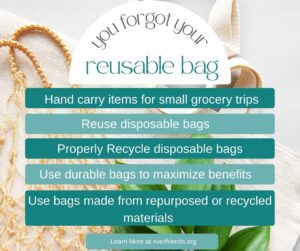SO YOU FORGOT YOUR REUSABLE BAG…
Starting on January 1, the City of Fredericksburg levied a 5-cent tax on each disposable bag sold at all grocery stores, drugstores and convenience stores within the 22401 zip code. This new tax has encouraged many residents to reconsider the way they shop. This post explores the pros and cons of several bagging options you can use to maximize the sustainability of your shopping habits – both globally and locally, for the planet and the Rappahannock River.
—
It’s a familiar situation. You’re walking into the grocery store (or the gas station, or the drugstore), only to realize that you left your trusty reusable shopping bag at home. 
For faithful reusable bag users, this can feel like a failure. After all, most studies suggest that repeated use of durable bags is the most environmentally friendly way to transport everyday goods like groceries, medications and household supplies. Durable bags rarely end up in landfills and they help keep our parks and wild places free of unsightly litter.
But what happens when you leave the bag at home? Here are 4 options you may consider at the checkout line:
Option 1: Carry your purchases out by hand
- PROS: The most river-friendly bag is no bag. It’s that simple.
- CONS: Doesn’t generally work for larger trips.
BOTTOM LINE: Skip the bag for small shopping trips.
Option 2: Purchase disposable plastic bags
- PROS: Globally, disposable plastic bags have the smallest environmental footprint per bag when compared to other options like paper bags and reusable bags. Standard plastic grocery store bags require far less energy, water and raw materials to manufacture per bag than these other options. Disposable bags are relatively durable and can be re-used for a number of household purposes including litter cleanup bags, trash can liners and doggie waste bags.
- CONS: Disposable plastic bags are a petroleum product that often end up as litter due to issues with storage and disposal. Because they are prone to blowing or washing away, many end up in places like the Rappahannock River. Plastics cannot biodegrade, so disposable bags physically break apart into smaller and smaller “microplastics”—harming wildlife from sea turtles to plankton along the way. Standard grocery bags cannot be recycled in traditional recycling facilities. They also cost 5 cents to purchase in the City of Fredericksburg.
BOTTOM LINE: Disposable bags are a fine option– but only if you reuse them and discard them properly.
Option 3: Use a paper bag
- PROS: Paper bags are composed of a renewable resource and are recyclable, biodegradable and compostable.
- CONS: Manufacturing a paper bag takes about four times as much energy as it takes to produce a plastic bag. Paper bags are not very durable and options for re-uses are limited.
BOTTOM LINE: Because they are biodegradable, paper bags have ecological benefits over plastic products. If you must use a paper bag, be sure to recycle it and avoid discarding in the landfill.
Option 4: Purchase a new reusable bag
- PROS: Each reusable bags can be used dozens or hundreds of times before being discarded. As a result, they contribute less litter to local ecosystems than disposable bags. Durable bags are inexpensive to purchase and have financial benefits for consumers who use them regularly. Bags can be fabricated using recycled materials or reclaimed items like t-shirts, and are available from local sources such as the Fredericksburg Food Coop. SNAP recipients are eligible for reduced-cost durable bags under Fredericksburg’s bag tax program.
- CONS: It takes lots of material and energy to manufacture a durable bag. The precise environmental costs depend on three factors: the source of the bag, the material from which it is made, and how many times it is ultimately used. A UK study found that manufactured cotton bags are so energy- and water-intensive that they must be used well over 100 times to equal the environmental footprint of a single use plastic grocery bag. The same study found that durable plastic bags composed of nonwoven polypropylene (PP) is a less impactful option but must still be used around 11 times equal to a single use bag.
BOTTOM LINE: Regular use of durable bags is the most environmentally friendly way to shop. To minimize your footprint, buy bags made from reclaimed materials if available. If you must purchase a new durable bag, consider a non-woven polypropylene bag instead of a cotton bag. Whatever you buy, use it as many times as you can.
In Summary…
When it comes to their environmental footprint, all forms of shopping bags have pros and cons. By following a handful of basic guidelines, the Rappahannock River community can minimize its impacts both locally and globally:
- Skip the bag and hand-carry your goods for small trips
- Reusing disposable bags greatly improves their environmental footprint
- Properly recycle or discard all disposable bags once they are no longer useful
- Use durable bags as many times as possible to maximize their benefits
- Select bags made from repurposed, recycled or reclaimed materials
Written By Adam Lynch, River Steward

